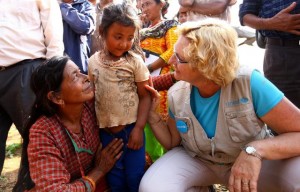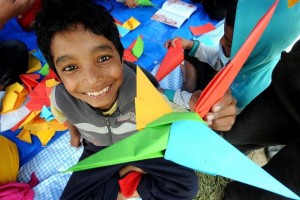UNICEF HK合共籌集港幣780萬元 支援尼泊爾救災工作 15所「兒童友好家園」已設立 幫助兒童克服恐懼
2015-05-04
| 香港,2015年5月4日──尼泊爾大地震至今發生超過一星期,大批兒童無家可歸、受驚過度、依然得不到基本照顧,聯合國兒童基金會(UNICEF)坦言,受災兒童的健康及福祉令人擔憂。UNICEF已在受災最嚴重的地區設立了15所「兒童友好家園」,幫助兒童面對災後生活。根據聯合國兒童基金香港委員會(UNICEF HK)最新籌款數字,加上從緊急救援基金撥出的港幣100萬元,至今籌集到港幣780萬元,支援UNICEF在尼泊爾的救災行動,保護尼泊爾兒童。 |  ©UNICEF/NYHQ2015-1097/Panday |
4月25日的大地震,令尼泊爾損毀嚴重。根據UNICEF最新評估,尼泊爾全國75個地區,近8成受災,受影響地區增至57個,其中12個災情嚴重,逾13萬間房屋被毀。兒童在災難中是最脆弱的,目前很多兒童都因為地震期間受驚,即使只發生極輕微的餘震,亦驚恐得哭泣。我們需要為受災最嚴重地區的兒童緊急設立「兒童友好家園」及臨時學校,讓他們盡快恢復正常生活。
 ©UNICEF/NYHQ2015-1078/Karki |
UNICEF已設立15所「兒童友好家園」,為數千名在加德滿都的受災兒童,提供藝術活動、遊戲及運動,讓他們打發時間及透過遊戲忘記傷痛,同時為受驚過度兒童提供心理輔導,助他們克服恐懼及走出災後創傷。UNICEF亦正運送更多物資到加德滿都,以備設立更多「兒童友好家園」;另外,UNICEF亦已分派教育及幼兒發展百寶盒、兒童百寶盒及防水帆布至加德滿都(Kathmandu)及勒利德布爾(Lalitpur)的臨時營地,準備為受災兒童設立臨時學習中心。 |
UNICEF HK主席陳晴女士宣佈:「很多兒童在地震發生後,生活出現逆轉,他們失去家人和房屋,災後生活更將面對沉重的壓力。我們必須保護尼泊爾兒童,幫助他們盡快回復正常生活。UNICEF HK已由緊急救援基金撥款港幣100萬元,計及公眾捐出的港幣680萬元善款,我們今已籌集到超過港幣780萬元,同時亦陸續有更多本地企業與UNICEF HK攜手,呼籲公眾支援UNICEF在尼泊爾的救災工作。」
香港市民可登入unicef.org.hk/donate,捐款拯救受尼泊爾地震影響的兒童及家庭。另外,由即日至5月底,美心集團旗下近250間分店將擺放UNICEF HK捐款箱,收集公眾捐款。
UNICEF向國際社會募集港幣3.93億元(5,035萬美元),以應付尼泊爾地震後3個月內的緊急人道需求。
「尼泊爾地震」捐款方法:
| 網上捐款: | /donate |
| 直接銀行存款: | 匯豐銀行:567-354014-005 |
| 中國銀行:012-875-0-021868-3 | |
| 永隆銀行:020-601-003-7634-8 | |
| 東亞銀行:015-260-81-012100 | |
| 捐款熱線: | 2833 6139 |
(籌得之善款若多於「尼泊爾地震」賑災所需,餘款將撥調聯合國兒童基金會其他緊急救援項目)
- 完 -
------------------------------
傳媒如有垂詢,請聯絡:
聯合國兒童基金香港委員會









